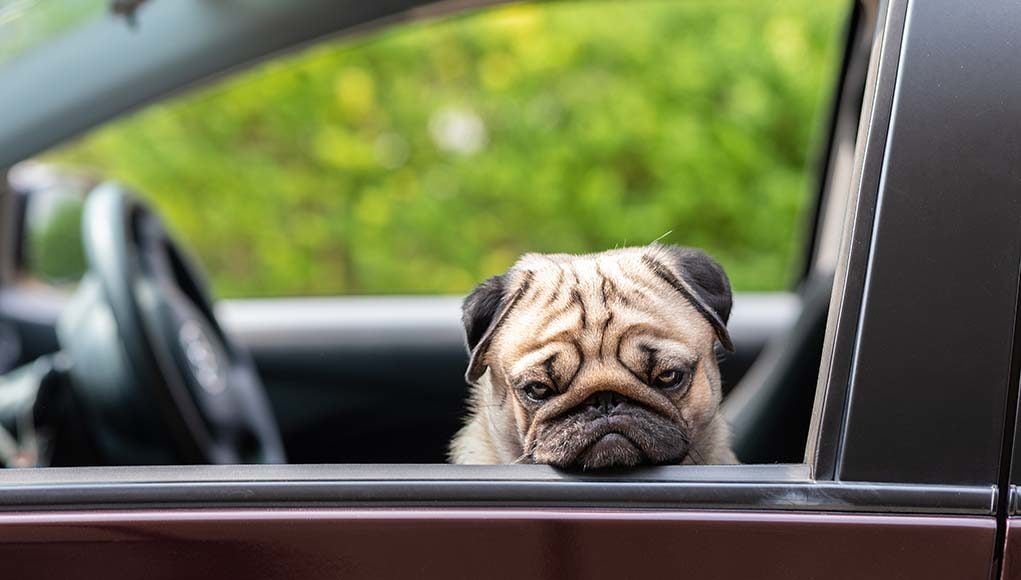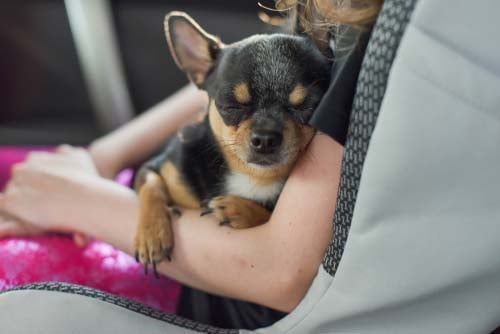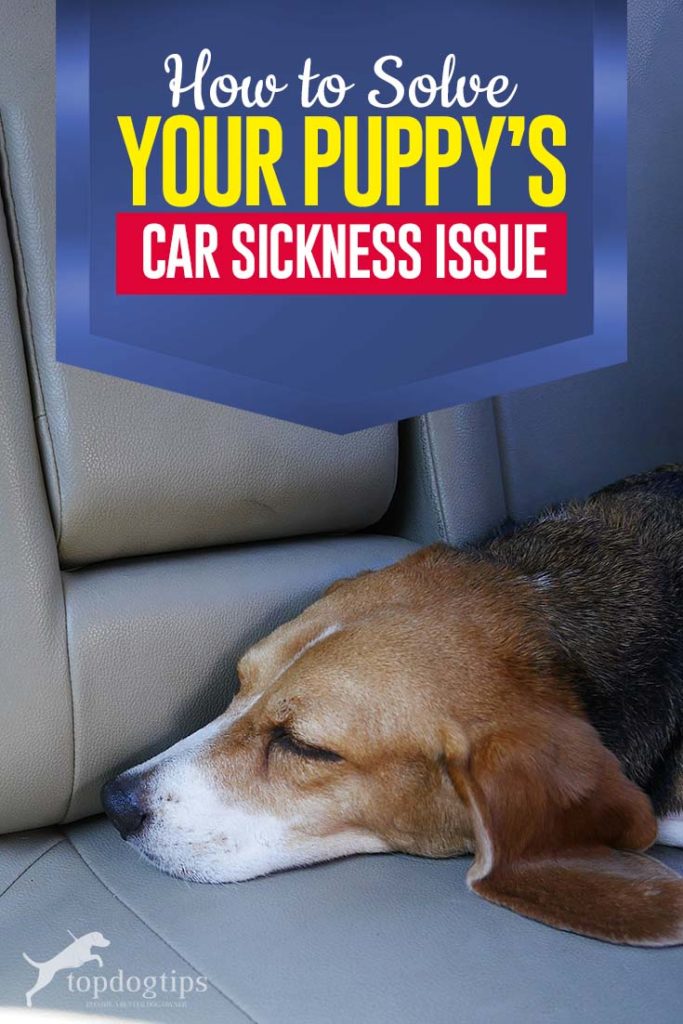Car sickness is something we are all familiar with but dogs can also feel it. It is far more common in puppies and many outgrow it after a certain period, but some don’t and it can be a problem. Understand the cause of your puppy car sickness and recognize the signs before you start treating it.
Why Puppies Feel Car Sickness?
The most common reason is the same motion sickness that we also feel sometimes. Puppies are not used to riding in a car, and it will be a brand new experience for your pet. A moving vehicle will affect a dog's inner ear and disrupt their sense of stability.
Additionally, parts of a dog's ear which are in charge of balance are not completely developed in young dogs, and they will be more sensitive to a car riding experience.
The feeling of dizziness when the car is moving is not unusual for a dog. The weird feeling in the stomach can also accompany this. And it will be even more emphasized if your puppy have just eaten before the car ride.
Car anxiety may be another cause. Most pet owners put their puppy in a car for the very first time when taking the dog to the vet or vaccination. Since these are discomforting or painful experiences, a dog will start associating car rides with something negative. You will notice if car anxiety is the cause of puppy car sickness if your pup starts whining in a car or tries to get out of it in fear.
Pay attention to your puppy’s behavior when the car starts moving. The dog who feels car sickness will start whining anxiously, they will be in a bad mood or seem afraid. Intense and excessive drooling is one of the most common signs, and don’t be surprised if the dog even vomits all over your car seat.
How to Solve Puppy Car Sickness
While motion sickness in dogs usually passes after a few rides in the car, anxiety can present a longer-lasting issue that leads to nearly chronic car sickness. In any case, there are a few things you can do to prevent or minimize the risk of puppy car sickness.
1. No Food Before the Ride
This rule can help ease the symptoms of motion sickness in puppies. That doesn’t mean that your dog should be hungry the whole day before the drive, but their last meal should be a couple of hours earlier.
For example, if the drive is planned for early in the morning, give your pooch a very small portion of food instead of a full one, or get up earlier to feed and take out your dog a couple of hours before the ride.
Offer your dog plenty of water, take them out for a bathroom break just before the ride, and prepare some more water for the road, especially if it’s a longer trip. Water can help to sooth irritated stomach in dogs and help with motion sickness.
2. Restrain Your Puppy in the Car
Never leave your dog jumping up and down, or sliding on the back seat when you drive. When dogs are young, it will be difficult for them to have orientation in the new space which is moving and to stay in one place as the car is passing through bumpy roads.
For this reason and many others, it's recommended to restrain your dog in the back seat to ensure safety and stability in the car. This can be done by a dog car seat, a puppy carrier or a travel crate. Additionally, you can install a barrier so that your pooch cannot bother you while driving for safety reasons.
Apart from the sense of stability, making sure that your dog is restrained and in the back seat will be much safer for them, preventing the dog from bumping their head due to sudden moves of the car, abrupt use of the brakes, or airbag popping up in an accident.
3. Make Your Car a Happy Place for the Dog
If anxiety is what's causing puppy car sickness, the best way to relieve your pet's stress is to make your car a happier and more welcome place for the dog.
Do that by putting some of your pup's favorite toys or blankets in the back seat. You can use some treats in the beginning and end of the ride, but not to put too much as over-eating can cause worse motion sickness.
Give enough praise to your dog when they behave properly within the car. This way the dog knows that they're doing something right, and will get the necessary training about the expected behavior in the vehicle.
For puppy toys, choose those specifically for chewing to avoid your puppy trying to play with them by racing in the car. Open the back window just a little bit to allow your pooch to feel the breeze and the smells of different places and some fresh air, but not so much that your dog would stick the head out, which is dangerous.
4. Take Breaks
Take a break if you see that your puppy is getting too nervous about the ride. Maybe it is because the dog needs to go potty outside, or simply wants to stretch their legs. This will add an exciting note of exploring new places when riding in a car with a puppy.
Most importantly, regularly take your puppy to a dog park, beach or some other place in the nature that they will love, using the exact same vehicle. This way the dog will learn that car is not only for taking them for a vaccinations, but also for going to fun places.
5. Give Your Puppy Medicine or Natural Remedies
If you've tried everything else but your puppy car sickness is getting out of hand, you can use medicine or natural remedies to relieve this issue.
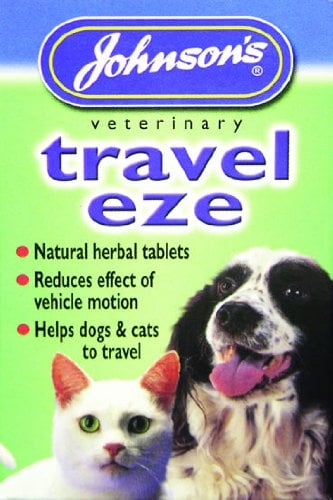 We recommend starting with natural remedies first to avoid potential side effects of over-the-counter medicine. There are several options you can try, such as Travel Eze tablets, Ask Naturals calming treats, Bach rescue remedy drops, or a Calming Aid Dog Supplement. All of these are made with natural ingredients, including certain food and oil blends.
We recommend starting with natural remedies first to avoid potential side effects of over-the-counter medicine. There are several options you can try, such as Travel Eze tablets, Ask Naturals calming treats, Bach rescue remedy drops, or a Calming Aid Dog Supplement. All of these are made with natural ingredients, including certain food and oil blends.
Alternatively, you can also take a more holistic approach with using foods. For example, ginger, chamomile and peppermint are all known to calm car anxiety in dogs. Kava, Valerian, passionflower, and skullcap have also been used for years to treat motion sickness. They may not always work, but because there are no side effects, it doesn't hurt to try.
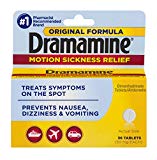 When it comes to over-the-counter puppy car sickness medicine, the most common are anti-nausea drugs. You can give Dramamine, the same medicine people with car sickness take. It's an antihistamine with dimenhydrinate as its active ingredient, and it helps to control motion sickness and prevents vomiting. Only use Dramamine‘s original formula, or the one designed for kids.
When it comes to over-the-counter puppy car sickness medicine, the most common are anti-nausea drugs. You can give Dramamine, the same medicine people with car sickness take. It's an antihistamine with dimenhydrinate as its active ingredient, and it helps to control motion sickness and prevents vomiting. Only use Dramamine‘s original formula, or the one designed for kids.
Alternatives to Dramamine include Gravol, Cerenia (prescription-only), and meclizine drugs like Antivert or Bonine. These are all anti-nausea medicines that will treat your puppy's motion sickness and prevent vomiting, but not the underlying cause (such as anxiety). To treat anxiety in extremely stressed puppies, you'll need anti-anxiety aids.
Because all medicines may have side effects, consult with your veterinarian about which drugs they recommend and the appropriate dosage.
At the Tail's End
Car sickness is very common in puppies, but most dogs outgrow it after a short period. It's not dangerous to your pet but it is uncomfortable, and needs to be addressed if it doesn't go away.
To prevent or solve puppy car sickness, don't let the dog eat before the ride, create a safe and comfortable spot in the back seat, put some toys and treats in the car to relieve your pet's stress and make it a habit to drive your dog to places they like from time to time.
If none of the other methods work, you can give your puppy natural remedies to calm them down and prevent vomiting, or you can try certain foods and herbs. Finally, there is motion sickness medicine for dogs like Dramamine to try as the last resort.
READ NEXT: 7 Best Car Seat Covers for Dogs to Protect Your Car’s Upholstery
Disclosure: We may earn affiliate commissions at no cost to you from the links on this page. This did not affect our assessment of products. Read more here and find full disclosure here.


